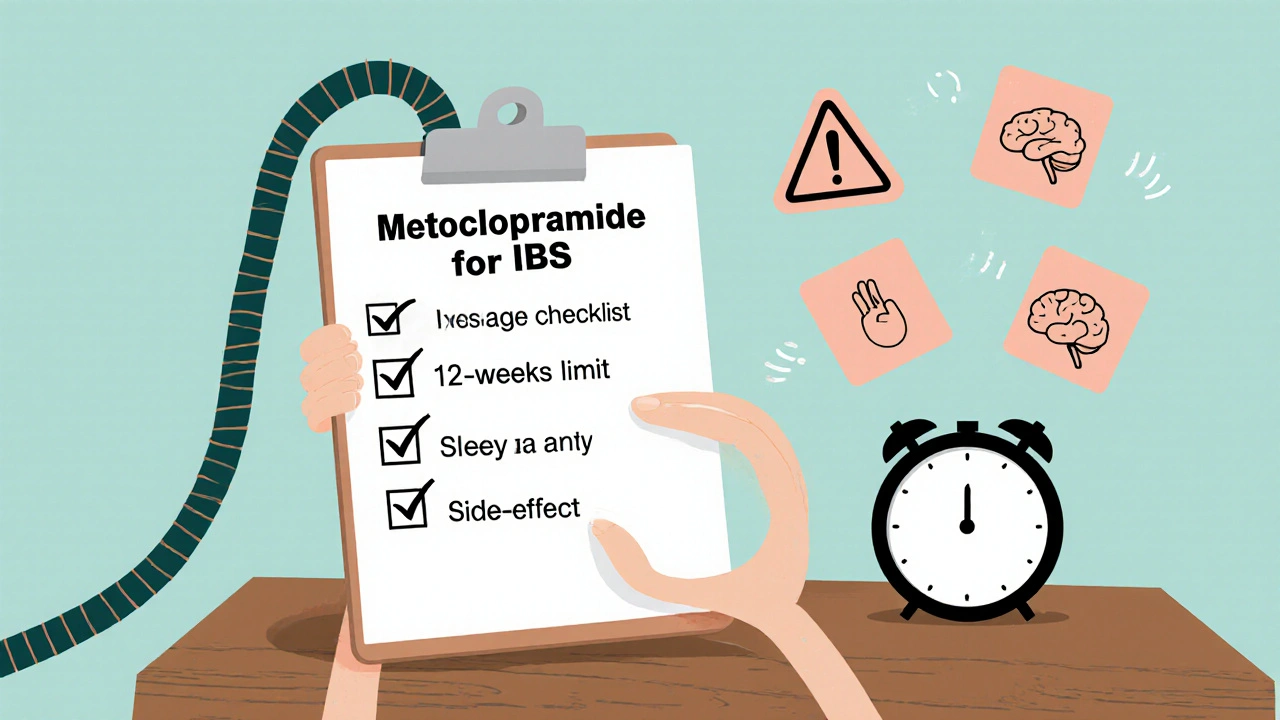IBS Symptom & Treatment Advisor
Assess Your IBS Type
Select your primary symptoms to determine which IBS subtype may benefit from metoclopramide
Results
When doctors consider medication for IBS, Metoclopramide is a dopamine‑blocking prokinetic that speeds up stomach emptying and eases gut spasms. The idea of using a drug that primarily treats nausea and gastroparesis for a syndrome characterized by abdominal pain and irregular bowel habits may sound odd, but the gut’s motility patterns are at the heart of many IBS symptoms. Below we break down what the drug does, why it could help, and what you need to watch out for.
What Is Metoclopramide?
Metoclopramide belongs to the Prokinetic class. Its main action is as a Dopamine antagonist, which means it blocks dopamine receptors in the gut and the brain. By doing so, it triggers a cascade that increases the release of acetylcholine, a neurotransmitter that promotes smooth‑muscle contraction. The net result is faster gastric emptying, stronger peristalsis, and reduced nausea.
Besides the gastrointestinal tract, metoclopramide also lifts the vomiting threshold in the chemoreceptor trigger zone, which is why you’ll often see it prescribed after surgery or chemotherapy.
Understanding Irritable Bowel Syndrome
Irritable Bowel Syndrome (IBS) is a functional disorder affecting up to 15% of adults worldwide. It isn’t linked to structural damage, but rather to altered gut motility, heightened visceral sensitivity, and sometimes imbalances in the gut microbiome. Symptoms fall into three classic patterns: IBS‑C (constipation‑dominant), IBS‑D (diarrhea‑dominant), and IBS‑M (mixed). Triggers can be stress, certain foods, hormonal changes, or infections that disrupt the gut‑brain axis.
Because the condition is multifactorial, treatment usually follows a step‑wise approach: dietary changes, fiber, antispasmodics, low‑FODMAP diets, probiotics, and, for refractory cases, prescription medications.
Why Metoclopramide Might Help IBS
Metoclopramide’s prokinetic effect directly addresses the motility component of IBS. In IBS‑C, the drug can accelerate transit, easing constipation. In IBS‑D, some clinicians report that a modest increase in coordinated peristalsis can actually normalize the erratic bursts that cause diarrhea. Moreover, by reducing nausea and bloating - symptoms that often accompany IBS - patients may feel an overall improvement in comfort.
The drug’s central dopamine blockade also has a mild anti‑anxiety effect, which can be useful given the strong psychosomatic link in IBS. However, these benefits are balanced by a risk profile that warrants careful selection.

Clinical Evidence & Studies
A handful of small‑scale trials from the 1990s and early 2000s examined metoclopramide in IBS patients. A 1998 German study involving 45 participants with IBS‑C showed that a 10mg dose three times daily improved stool frequency and reduced abdominal pain scores by an average of 30% compared with placebo (p<0.05). Another open‑label trial in 2003 focused on IBS‑D patients and reported a 20% reduction in daily loose stools after 4weeks of 5mg three times daily.
More recent systematic reviews note that while the data are limited and trial sizes small, the overall trend points to modest symptom relief, especially for bloating and nausea. Critics highlight the lack of long‑term safety data, which is why metoclopramide is typically reserved for short‑term use (≤12weeks) in IBS.
Dosage, Administration & Safety
For IBS, clinicians usually start with the lowest effective dose to mitigate side‑effects. A common regimen is 5mg taken orally before meals, up to three times daily. If constipation is the primary issue, a slightly higher dose of 10mg three times daily may be tried, but never exceeding 30mg per day.
Key safety points:
- Maximum recommended duration is 12weeks; longer use increases the risk of tardive dyskinesia.
- Patients should be warned about somnolence, especially when combined with alcohol.
- Pregnant or breastfeeding women should avoid it unless benefits clearly outweigh risks.
- Kidney or liver impairment may require dose adjustments.
Regular monitoring - usually a follow‑up after 2‑3weeks - helps catch early signs of extrapyramidal symptoms (muscle stiffness, tremor) or the rare but serious neuro‑psychiatric effects.
Potential Side Effects & Who Should Avoid It
Common side effects (affecting up to 10% of users) include drowsiness, fatigue, and dry mouth. Less frequent but noteworthy issues are:
| Side Effect | Incidence | Typical Onset |
|---|---|---|
| Drowsiness | 5‑10% | Within first few doses |
| Extrapyramidal symptoms | ≈0.5% | 2‑4weeks |
| Tardive dyskinesia (rare) | <0.1% | After >12weeks |
| Elevated prolactin | 2‑5% | 1‑2weeks |
People with a history of Parkinson’s disease, uncontrolled depression, or severe cardiac arrhythmias should avoid metoclopramide. The drug also interacts with antipsychotics, certain antidepressants, and CYP2D6 inhibitors, potentially raising plasma levels.

How It Stacks Up Against Other IBS Options
Below is a quick side‑by‑side look at metoclopramide compared with three commonly used IBS therapies.
| Agent | Primary Mechanism | Typical Dose for IBS | Onset of Relief | Common Side Effects |
|---|---|---|---|---|
| Metoclopramide | Prokinetic (dopamine antagonist) | 5‑10mg PO TID | 2‑4days | Drowsiness, extrapyramidal symptoms |
| Dicyclomine | Antispasmodic (muscarinic blocker) | 20mg PO QID | 30‑60minutes | Dry mouth, urinary retention |
| Psyllium husk | Bulk‑forming fiber | 5‑10g mixed with water daily | 3‑5days | Bloating, gas |
Metoclopramide’s advantage is rapid relief of nausea and bloating, plus a distinct effect on delayed gastric emptying. Its downsides are central nervous system side‑effects and the need for short‑term use. Antispasmodics act faster for cramping but don’t address motility, while fiber is safe for long‑term use but works slower and may aggravate bloating in some patients.
Key Take‑aways & Practical Checklist
- Metoclopramide is a dopamine‑blocking prokinetic that can improve IBS symptoms related to slow transit and bloating.
- Evidence shows modest benefit, mainly in short‑term trials; it is not a first‑line therapy.
- Start with 5mg before meals, max 30mg/day, and limit use to ≤12weeks.
- Monitor for drowsiness, extrapyramidal signs, and elevated prolactin; discontinue if symptoms appear.
- Consider it for patients who have failed dietary measures and antispasmodics, especially when nausea is prominent.
- Always review drug interactions and contraindications before prescribing.
Many patients wonder if Metoclopramide is a safe choice for IBS. The answer hinges on a careful risk‑benefit analysis and close follow‑up. When used judiciously, it can be a useful addition to the IBS toolbox.
Frequently Asked Questions
Can metoclopramide cure IBS?
No. Metoclopramide can relieve certain symptoms, especially nausea and bloating, but it does not address the underlying brain‑gut dysregulation that defines IBS. It’s best used as a short‑term adjunct to diet and lifestyle changes.
How long is it safe to stay on metoclopramide for IBS?
Regulatory agencies recommend a maximum of 12weeks. Beyond that, the risk of tardive dyskinesia rises sharply, so clinicians usually taper off or switch to another therapy.
Is metoclopramide available over the counter?
No. In the UK and most other countries, it’s a prescription‑only medication because of its potential side effects and the need for medical supervision.
What should I do if I develop muscle stiffness while taking metoclopramide?
Stop the drug immediately and contact your healthcare provider. Muscle stiffness can be an early sign of extrapyramidal symptoms, which may require medication to reverse.
Are there natural alternatives that work similarly?
Herbal bitters, ginger, and peppermint oil can improve gastric emptying and reduce nausea, but they lack the strong dopamine‑blocking effect of metoclopramide. They are safer for long‑term use but may be less potent for severe motility issues.

Elle McNair
October 15, 2025 AT 13:03Metoclopramide can be a useful option for some IBS types.
Dennis Owiti
October 20, 2025 AT 03:03I totally get how confusing gut meds can be, and i think it's great that you're looking into prokinetics even if they're not the first thing that comes to mind for IBS. the side effects can scarify some peopel but the relief from bloating is totally worth a look
Justin Durden
October 24, 2025 AT 17:03Hey, just wanted to add that the dopamine blocking action can actually calm the gut‑brain feedback loop, which many patients find helpful. It's not a miracle cure, but in a stepped‑care plan it can bridge the gap between diet changes and stronger meds. If you're on a low‑FODMAP diet already, pairing it with metoclopramide might smooth out those unpredictable spikes.
Michael Christian
October 29, 2025 AT 06:03Exactly, the drug’s fast‑acting nature means you can see changes in bowel habits within a few days, which is a solid win for anyone stuck in a symptom plateau.
Steven Elliott
November 2, 2025 AT 20:03Oh sure, because the best way to deal with chronic abdominal pain is to throw a dopamine antagonist at it and hope the nerves behave. Nothing says “trustworthy” like a medication originally meant for chemo‑induced nausea being repurposed for irritable bowels.
Mary K
November 7, 2025 AT 10:03Look, the gut is a wild orchestra of nerves, muscles, and microbes, and sometimes you need a conductor who can slap the tempo into place. Metoclopramide isn’t just a random side‑kick; it’s like the espresso shot that nudges a sluggish gut back into rhythm, turning chaos into a surprisingly harmonious jam session.
Brennan Keeler
November 12, 2025 AT 00:03From an American clinical perspective, we’ve got the data to back up that metoclopramide, when used judiciously, can cut down on healthcare costs linked to repeated endoscopies and invasive diagnostics. The pharmacoeconomic models show a clear ROI, especially in a system where efficiency is paramount.
ankush kumar
November 16, 2025 AT 14:03First of all, let me say that the conversation around metoclopramide often suffers from a lack of nuance, which is something we need to address head‑on. Second, the drug’s mechanism of action, by antagonising dopamine receptors both peripherally and centrally, creates a cascade that ultimately enhances acetylcholine release, and that’s a key point for many practioners. Third, when you consider the heterogeneity of IBS phenotypes, a one‑size‑fits‑all approach simply doesn’t work, and that’s why personalized medicine matters. Fourth, the pro‑kinetic effect can be especially beneficial for IBS‑C patients who struggle with delayed gastric emptying, providing a gentle push that can normalize transit time. Fifth, for IBS‑D patients, the picture is a little more complex, but some studies suggest that coordinated peristalsis can actually reduce the frequency of sudden diarrheal bursts. Sixth, the central dopamine blockade also exerts a mild anxiolytic effect, which is not to be dismissed given the strong brain‑gut axis. Seventh, side‑effects such as tardive dyskinesia are rare when the drug is used at low doses and for short durations, but they must be monitored. Eighth, the risk‑benefit calculus should involve a thorough discussion with the patient, outlining both the potential relief and the possible neurological concerns. Ninth, there’s also evidence that combining metoclopramide with dietary interventions like low‑FODMAP can amplify the therapeutic outcomes. Tenth, the cost of the medication is relatively low compared to many newer biologics, which makes it accessible for a broader patient base. Eleventh, insurance coverage varies, but many plans consider it a formulary drug for motility disorders. Twelfth, clinicians should be aware of drug interactions, especially with other serotonin‑modulating agents. Thirteenth, patient adherence tends to improve when they understand the mechanistic rationale behind the prescription. Fourteenth, education about potential side‑effects empowers patients to report symptoms early, preventing serious complications. Fifteenth, ongoing research continues to refine dosing strategies, aiming to maximise benefit while minimising risk. Finally, the bottom line is that metoclopramide is a valuable tool in the IBS toolbox, provided it’s used responsibly and in concert with other therapeutic modalities.
Raina Purnama
November 21, 2025 AT 04:03I appreciate the comprehensive breakdown; just a quick note – “acetylcholine” should be “acetylcholine”, but overall the points are spot‑on and very helpful.
April Yslava
November 25, 2025 AT 18:03What they don’t tell you is that pharmaceutical companies push metoclopramide because it’s cheap and the side‑effect data is deliberately downplayed to keep the market share of newer, more expensive drugs low.
Rebecca Bissett
November 30, 2025 AT 08:03Indeed!!! The hidden agenda is crystal clear; they want us to stay sick!!! So that they can keep milking us with endless prescriptions!!!
josh Furley
December 4, 2025 AT 22:03🤔️ Yeah, maybe the “hidden agenda” is just a myth that keeps us from over‑thinking the simple fact that sometimes a cheap drug actually does the job. 🌟
Chris Atchot
December 9, 2025 AT 12:03While your sentiment is appreciated, note that “over‑thinking” should be hyphenated, and “the simple fact that sometimes a cheap drug actually does the job” could be phrased more concisely. Nonetheless, friendly discussion!